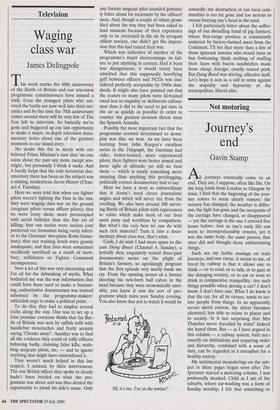Television
Waging class war
James Delingpole
This week marks the 60th anniversary of the Battle of Britain and our television programme commissioners have missed a trick. Even the youngest pilots who sur- vived the battle are now well into their sev- enties and by the time the 70th anniversary comes around there will be very few of The Few left to interview. So basically we've gone and buggered up our last opportunity to make a major, in-depth television docu- mentary series about one of the greatest moments in our island story.
No doubt this fits in nicely with our beloved Prime Minister's view that 'no one cares about the past any more except nos- talgia', but personally I think it sucks. And it hardly helps that the only terrestrial doc- umentary there has been on the subject was a sniping, tendentious Secret History (Chan- nel 4, Tuesday).
Here we were told that when our fighter pilots weren't fighting the Hun in the sun, they were waging class war on the ground (sergeant pilots versus officer pilots); that we were lousy shots, more preoccupied with aerial balletics than the fine art of killing; that our tactics were useless (our preferred vee formation being vastly inferi- or to the Germans' two-plane Rotte forma- tion); that our training levels were grossly inadequate; and that lives were sometimes needlessly sacrificed as a result of snob- bery, selfishness or Fighter Command incompetence.
Now a lot of this was very interesting and I'm all for the debunking of myths. What bothered me was the way information that could have been used to make a fascinat- ing, authoritative documentary was instead suborned by the programme-makers' tabloidish urge to make a political point.
To do this, they had to employ several tricks along the way. One was to set up a false premise: everyone thinks that the Bat- tle of Britain was won by raffish toffs with handlebar moustaches and fruity accents saying 'Chocks away!'. Another was to find all the evidence they could of toffy officers behaving badly, claiming false kills, snub- bing sergeant pilots, etc. — and to ignore anything that might have contradicted it.
They weren't much helped in this last respect, I noticed, by their interviewees. The one British officer they spoke to clearly hadn't been briefed on what the pro- gramme was about and was thus denied the opportunity to plead his side's cause. Only one former sergeant pilot sounded genuine- ly bitter about his treatment by the officers' mess. And, though a couple of others grum- bled about the way they had been asked to lead missions because of their experience only to be overruled in the air by arrogant officer novices, one didn't get the impres- sion that this had ruined their war.
Which was indicative of another of the programme's major shortcomings: its fail- ure to put anything in context. Had it been less disingenuous, it would surely have admitted that this supposedly horrifying gulf between officers and NCOs was con- sidered perfectly acceptable by 1940s stan- dards. It might also have pointed out that the reason so many pilots were ill-trained owed less to stupidity or deliberate callous- ness than it did to the need to get men in the air as quickly as possible in order to counter the greatest invasion threat since the Spanish Armada.
Possibly the most important fact that the programme seemed determined to down- play was this: we won. As we have been learning from John Keegan's excellent series in the Telegraph, the Germans had older, better-trained, more experienced pilots; their fighters were better armed and more agile at altitude; yet still we beat them — which is surely something more amazing than anything this pettifogging, politically correct documentary had to say.
Here we have a story so extraordinary that it doesn't need clever journalistic angles and which will never tire from the retelling. We also have around 300 surviv- ing Battle of Britain pilots with experiences to relate which make most of our lives seem puny and worthless by comparison. But what's the very best we can do with such rich material? Turn it into a docu- mentary about class war, that's what.
Gosh, I do wish I had more space to dis- cuss Dying Breed (Channel 4, Sunday), a lyrically shot, exquisitely scored three-part documentary series on the plight of Britain's farmers, so agonisingly poignant that the first episode very nearly made me cry. From the opening scenes of a farmer shooting his new-born bull calves in the head because they were economically unvi- able, you knew it was the sort of pro- gramme which ruins your Sunday evening. You also knew that not to watch it would be `Hi, its me. I'm on the temne!' cowardly: the destruction of our rural com- munities is too far gone and too serious to excuse burying one's head in the sand.
I felt particularly bitter about the suffer- ings of our dwindling band of pig farmers, whose free-range produce is consistently undercut by factory-farmed meat from the Continent. I'll bet that more than a few of those ignorant townies who would have us ban foxhunting think nothing of stuffing their faces with bacon sandwiches made from cheap, foreign, cruelly reared pork. But Dying Breed was stirring, effective stuff. Let's hope it acts as a call to arms against the stupidity and hypocrisy of the metropolitan, liberal elite.


























































 Previous page
Previous page